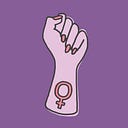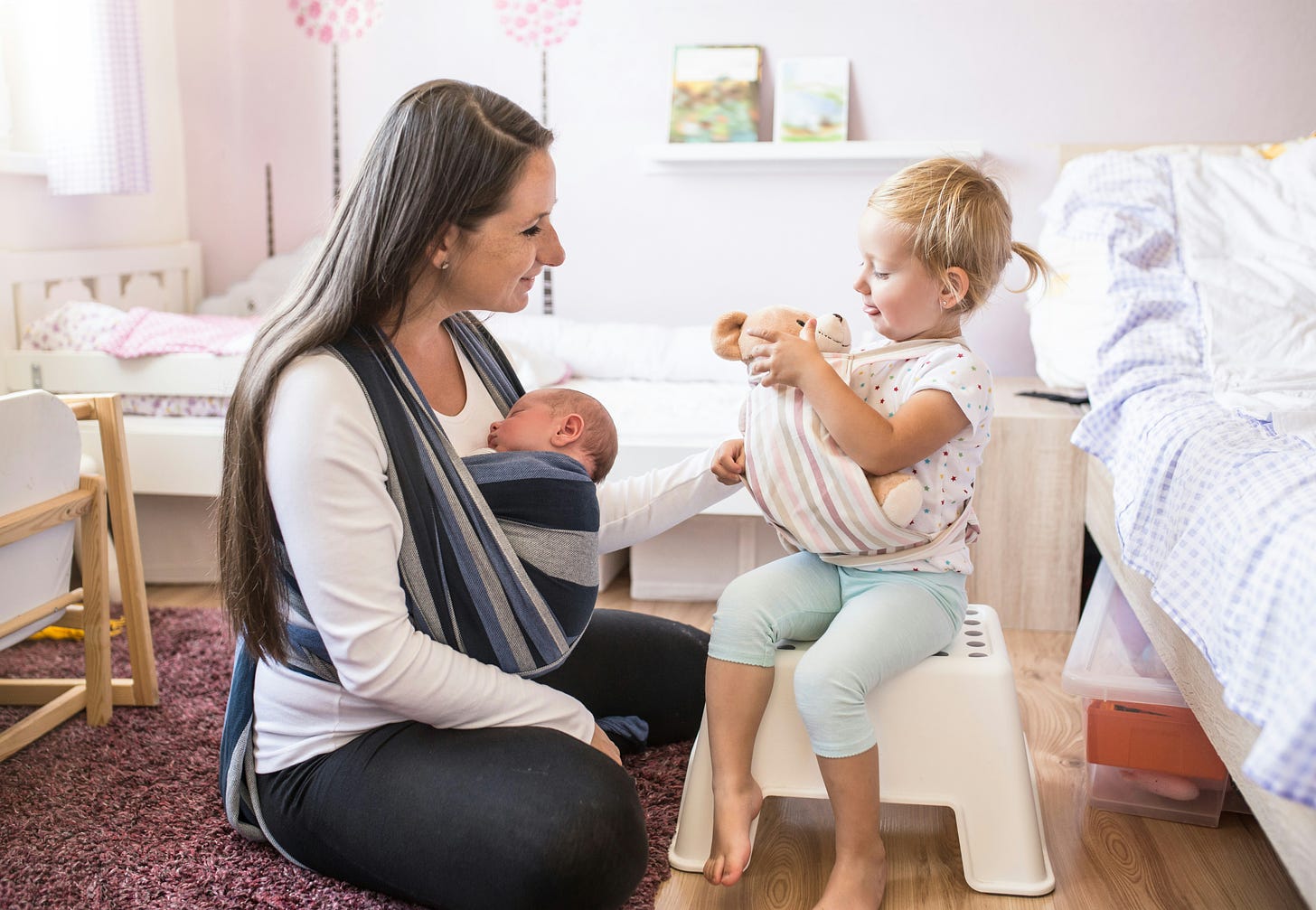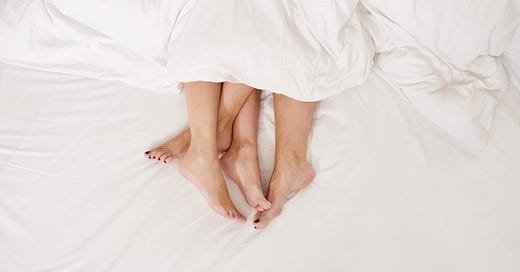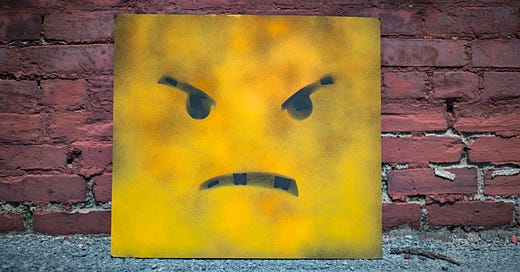

Discover more from Liberating Motherhood
Feminism has a motherhood problem
How anti-mother bias and childism undermine feminism's progress and doom young feminists to face the same issues as their foremothers
Several months ago, after yet another round of threats from incels and their low value friends, I announced that I was going to change the name of my Facebook page to Liberating Motherhood. The goal was to have consistent branding across all platforms, and also to divorce my work a bit from my name.
The reaction was swift, and angry. People did not want to be associated with a page for mothers. Even though I’ve been writing almost exclusively about mothers and motherhood on that very same page for years. And seemingly in spite of the fact that the issues that affect mothers also affect all of us, a large group of followers just couldn’t see feminism for mothers as relevant to them. Several called me “entitled” (a favorite patriarchal insult for mothers) for wanting to continue writing about motherhood and be honest that this is what I’m doing.
Around the same time, I applied for a writing fellowship with a large feminist organization. Lots of people applied, and I’m sure lots of great writers were rejected. But their feedback to me revealed a lot: “We want something a bit more inclusive than motherhood and feminism.”
Eighty percent of women eventually become mothers. The writer they chose writes exclusively about celebrities, because somehow millionaires and billionaires are far more relevant to women than motherhood, the pressure to become a mother, and the way motherhood culture affects us all.
I’ve attended countless feminist events where children aren’t welcome, thereby excluding some of the most marginalized women: mothers with children who cannot afford childcare, and who therefore cannot afford to leave their relationships or their homes.
Feminism has a motherhood problem.
And that problem harms everyone.
Perhaps most importantly, it ensures that the next generation of women faces the same degradation and abuse their foremothers faced. Because when we divide young, childless women from mothers, they cannot benefit from mothers’ wisdom and experience, and cannot develop a strategy for pushing back against the oppression they will inevitably face if they too become mothers.
Ignoring mothers at feminism’s peril
We dismiss matters of true life or death as mere “mommy wars.” And any time any mother anywhere writes about motherhood as a political struggle, as something that is difficult in a patriarchal society, some child-free misogynist will happily show up to call her entitled, tell her that mothers make everything about themselves, and to remind her that she chose this.
Navigate to any of the major feminist websites. Click on their writers. You'll see a sea of hip, thoughtful people in their twenties and early thirties. It's as if feminists die when they hit 35.
It's gotten worse over the last 10 years. When I was in college, being a feminist was the least cool thing you could be. Now every college student I know proudly identifies as a feminist. That's great progress. It's also turned feminism into something of a trend. It's what the cool people do.
Young women’s issues are vital to the feminist project, and we should neither abandon them nor minimize their importance. Young women, though, eventually become older women. Almost all of them become mothers. And the most important determinants of what happens to a woman as a mother occur before she has kids or selects a mate. The early stages of dating, when a woman vets her partner, before he can trap her, may determine the course of her life, and especially of her life as a mother.
The problem is that when a young woman's only connection to motherhood is through her own mother, she can't see older women or mothers for who they really are. They're caricatures. They're irrelevant. They're something to rebel against.
And so we end up with a feminist movement catering exclusively to young (+affluent, +mostly white) women. Just as a white or male-dominated organization will neglect the needs of people who don't check those boxes, a feminist movement primarily led by young people will ignore older women. We can't expect people to think critically and deeply about issues that don't affect them. That's why it's not enough for feminist websites to occasionally assign an article about "older women" to a 20-year-old, or to ask a childless man to write about the maternal health crisis.
And most women are over 35. This means that mainstream feminism isn't so much a women's movement. It's a movement for young, childless women.
Some of feminism's most pressing issues exclusively affect older women and mothers. And almost every feminist issue is compounded by age. That's intersectionality 101. Occupy more than one oppressed category and you experience a categorically different form of oppression.
Depictions of mothers, and how they harm women
Mothers have a unique vantage point, because by definition, we used to not be mothers. We know what that experience is like. And almost every mother I know observes an immediate change in how people treat her when she has kids. Many have told me about differences in how people treat them when they go out with and without their kids.
It can be really subtle: the man in a store who radiates contempt because he clearly thinks mothers and children shouldn’t be out in public; the barista who seems immediately annoyed at the presence of a mother with children. In subtle but pervasive ways, mothers get a constant message that they are annoying, uncool, irrelevant, embarrassing. And, of course, they’re really bad at motherhood. Because to be a mother in a patriarchal culture is to experience judgment and shame. Motherhood means you’re wrong, no matter what you do, and being a bad mother is the very worst thing you can be.
Society mistreats mothers, frames them as unattractive, annoying, and irrelevant. And when we push back on any of this, we’re told that we’re entitled. How very dare mothers want anything?! This is the perfect trick: guilt mothers into thinking politically constructed problems are personal shortcomings, then shame them for asking for help. This leaves mothers in a permanent tailspin, blaming themselves and constantly trying to do more and better, rather than rallying together with other mothers to change the objectively unacceptable conditions in which society forces us to mother.
How ignoring mothers dooms and divides women
Anti-mother misogyny doesn’t just harm mothers, though. In fact, one of the main reasons patriarchy denigrates mothers has absolutely nothing to do with abusing mothers.
The scam works like this: Convince young women to ignore mothers as irrelevant. Blame mothers for their own problems, and convince young women that mothers create their own problems, too. Stigmatize mothers as entitled when they demand better or attempt to educate the next generation.
What happens? Young women don’t notice and don’t care about anti-mother oppression. So they don’t proceed with caution. They jump headfirst into motherhood. They marry men who do nothing but wave red flags. And by the time they realize that patriarchy has indoctrinated them to do this, to accept male abuse, they’re trapped.
Every time you hear someone tell you that mothers’ problems are their own fault, there is an agenda.
Every time someone calls mothers entitled for demanding better, there is a reason.
They want everyone to disbelieve and disregard mothers, so that we can maintain a steady supply of young women marrying men who are objectively awful. This allows men to continue to reap the myriad benefits of marriage without ever having to change.
Anti-mother misogyny harms women who never become mothers, too, though. By dismissing the overwhelming majority of women, this intense misogyny ensures that women can’t band together and demand radical change. The goal is to pit women against each other. Convince child-free women that mothers are losers, breeders, stupid. Convince women who want to one day have children that mothers’ issues are irrelevant to them. And suddenly you have multiple classes of women who have been taught to hate one another rather than realize that their interests are allied. When women fight each other, they’re distracted from fighting the real enemy: sexist, racist, ableist, oppressive abuse.
Why everyone needs to care about mothers’ issues
Mothers’ issues matter because mothers are human beings.
The measure of a person’s character is how much they care about issues that don’t affect them.
It’s really that simple.
Mothers’ issues are relevant to us all, and to turn away from mothers is to turn away from women and toward misogyny.
Let’s end feminism’s motherhood problem with this generation, so that the next generation finally has a chance at true liberation.















I would go so far as to say that motherhood is the reason there is unequal treatment of the sexes across the world. Pregnancy, birth, and childrearing are the reason men all over the world are in charge. I'm sure it's been happening for thousands of years. Men are in charge because they can be. They aren't saddled with reproduction and childrearing. They set up the world to work for them. I'm reaching a point in my thinking where I feel a matriarchal society like elephants have is the only healthy way for females of a species to live.
I am childfree, and the amount of misogyny in childfree online spaces is staggering. Most of it comes from men, but a lot from other women. I find it very shocking especially when coming from women who claim to be feminists - isn't it obvious that when mothers lose, all women lose? Without solidarity with each other, what do we have?